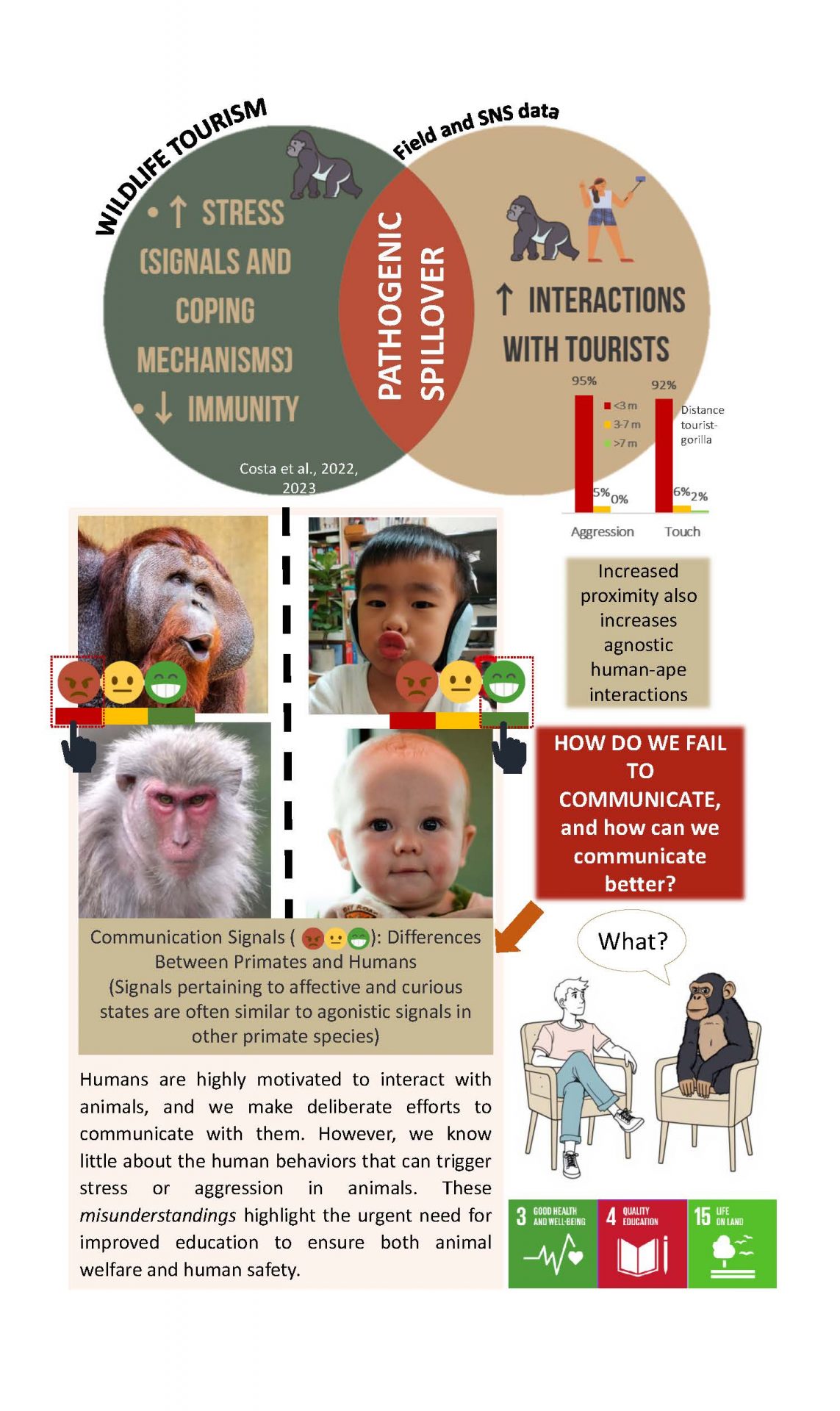Animal behavior
Primatology
Human-animal interactions
Animal welfare and conservation
Inter-species communication

PEREIRA COSTA Raquel Filomena
Starting year 2025
Nagoya University Institute for Advanced Research
Research fields
Research Interests
Primates
Turn-taking Communication
Conservation
One Health
Responsible Tourism
Professional Memberships
Primatological Society of Japan
Main research topics
Variables in Human-Animal Interactions are critically influenced by the species, environment, personal histories, and cultural factors. Most research in this field aims to quantify the type and amount of behavioral and physiological responses exhibited by each party following an interaction; but the interaction itself is often overlooked. Previously, our research revealed that zoo visitors form the strongest connection with gorillas compared to other animals. However, in the wild, we observed that gorillas exhibited increased stress levels and displayed aggressive behaviors when close to tourists. Regrettably, neither in captivity nor in the wild have we examined specific human behaviors—such as gestures, facial expressions, or vocalizations—that may trigger these interactions and subsequent behavioral changes. This is particularly important given that humans typically make deliberate efforts to communicate, while animals adapt their responses accordingly. However, certain facial expressions and gestures used in a friendly context by humans are, in turn, hostile signals used by other primates (e.g., a human smile or eye gaze perceived as aggression by macaques), which may escalate to aggression between parties. These misinterpretations can inadvertently signal aggression to the animals, leading them to perceive humans as a threat, which could explain our results of gorillas’ increased aggression towards close tourists. Together, these studies have highlighted the urgent need for effective behavioral changes to safeguard animal welfare and human safety, considering that tourists often fail to understand the animals’ behavior well enough to identify imminent aggression or stress signs and have little understanding of the potential for disease transmission. 
Representative papers
Costa, R., Xu, S., Brandão, A., & Hayashi, M. (2025). Reconnection with nature through empathy: rewiring people and animals by assessing zoo visitors’ connection to species and the need for their conservation. Frontiers in Psychology, 16, 1517430.
Costa, R., Brandao, A. & Hayashi, M. (2024). The behavioral sequences of mountain gorillas under tourism pressure – insights for tourism sustainability. Primates Conservation, IUCN Special Group, 37 (37): 121-133.
Costa, R., Tomonaga, M., Huffman, M. A., Takeshita, R., Bercovitch, F., Kalema‐Zikusoka, G., & Hayashi, M. (2023) The impact of tourist visits on mountain gorilla behavior in Uganda. Journal of Ecotourism, 1-19.
Costa, R., Romano, V., Pereira, A. S., Hart, J. D., MacIntosh, A., & Hayashi, M. (2022). Mountain gorillas benefit from social distancing too: Close proximity from tourists affects gorillas’ sociality. Conservation Science and Practice, 5(1), e12859.
Research URL
Global issues to be solved through this project
Bridging Worlds: Exploring Turn-Taking Communication Between Apes and Humans to Promote Nature Conservation, One Health, and Responsible Tourism
As awareness of global warming grows, driven by its visible impacts on the planet and human health, the need to reconnect with nature has never been greater. One key to the natural world is our connection with animals, rooted in evolutionary, psychological, social, and biological factors, which often drives us to seek interaction with them. Building on this idea, this project proposes investigating HAI to demonstrate their impact on health and well-being for both humans and animals. These guidelines aim to minimize stress on wild and zoo animals, enhance human safety, and enrich the tourist and visitor experience. By fostering a healthier, safer, and more educational environment, we seek to promote behavioral change and increased awareness of Nature Conservation and One Health among the broader public. In addition, our project also presents an important input for the evolutionary roots of our syntactic structure of language, as we should pinpoint similarities in communicative signals across species and link these variations to phylogenetic differences within the Hominidae family.
Interview
No interview
News
No related news

